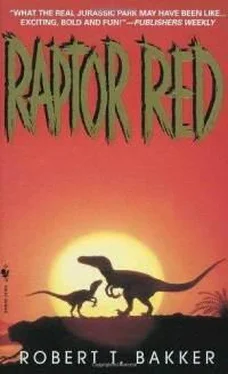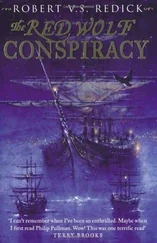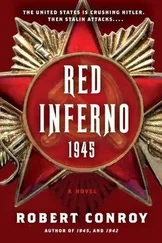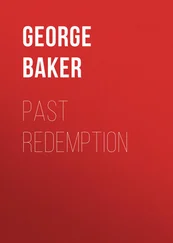The hidden hand of natural selection is nearly everywhere. Every time a dinosaur makes a choice that affects its reproductive success, the beast is playing the evolution game. Every time a bird helps her sister or her daughter or her granddaughter raise a brood, the act is recorded in the book of genetic success. Every time a turtle seeks a mate, the deed affects the standing of the turtle’s genes in the Darwinian playoff.
But the old dactyl has bowed out of the Great Game. He’s ended his own contribution to his gene pool entirely. He doesn’t breed himself, and he doesn’t help his kin to breed. In fact, he avoids all others of his species. He’s outlived his Darwinian usefulness, and he’s enjoying it immensely.
Joy is built in by evolution to keep animals doing what’s good for their genes. The great white dactyl flies because it gives him pleasure. Since he has given up the responsibilities of reproduction, he’s free to make up the rules of life as he goes along. He likes soaring to heights where he can spy on the earthbound dinosaurs below. He likes flaunting his aerial expertise by zooming at the predators who rule the underbrush.
Pound for pound, his brain is even larger for his size than the raptors', and big brains demand to be exercised. So the white dactyl invents games. He dives at giant plant-eating dinosaurs, just to see them panic and mill around nervously, the adults trying to shield their calves. He zips close to the water when the crocs are sunning themselves. He likes to see the long sequence of splashes erupt as one crocodile after another launches itself into the algae-green water.
And the old dactyl likes eating. He likes sharks, lungfish, pond turtles, baby crocodiles, and the eggs of other dactyl species. The drought has cut off his seafood and poultry, but he’s in no danger of gastronomic deprivation. He has learned how to get Utahraptors to serve him aged red meat.
Raptor Red’s sister didn’t notice that one of the little chicks had wandered away from the pack. When the chick comes squawking back, she gives it a perfunctory greeting that does little to reassure the hungry, frightened youngster.
The young male watches the interaction between mother and chick, and he gets more and more worried. Raptor Red’s pack seems to be coming apart: The social bonds are getting weaker, and he’s afraid the group will disintegrate if the drought lasts much longer.
The raptor family has camped along one of the few rivers that is still flowing during this severe midsummer dry season. Adult raptors can go without food for a week, but they must have water every day - water to keep their nerves and muscles working, and water to cool their bodies. The small chicks suffer the most. Their fast-growing bodies make enormous demands for food, and they whine and nudge Raptor Red and her sister, begging at the adults' muzzles for food to be regurgitated. But the adults have no food.
Raptor Red looks at the chicks, then at her sister. Without making a sound or a gesture, the two adult females have come to a dreadful agreement: Soon they must abandon the two youngest chicks. Raptor Red’s sister has defended her offspring with deadly vigilance for five months, but now she’s ready to leave them to die.
It has to be this way. Adult predators must sacrifice their chicks so that the mothers can survive to next season, when they might breed again. The cruel calculus of evolution permits no sentimentality. Save the children first! is a motivation that would kill off the entire genetic line, mother and children both. It would be gene-foolish for Raptor Red’s sister to risk her life now - she might have twenty more reproductive seasons, so any one set of chicks is expendable.
All through the ages, most predator young die during the famine season - raptor chicks die in the Early Cretaceous, just as allosaur chicks died in the preceding Jurassic, and just as lion cubs will starve to death, abandoned in the summer on the Serengeti.
The Utahraptor chicks don’t realize that this could be their last day. But they do have an instinctive urgency; their genes have turned on their last-ditch defense, a pitiful display of begging designed to appeal to their adult protectors.
Raptor Red’s stomach tightens into a knot. She feels very empty and looks away from the chicks. The young male walks slowly over and bumps her snout. She doesn’t respond. The famine will drive them apart soon.
When the herbivore herds provide abundant victims, it’s best for the pack to stay together, so that two or three raptors can bring down big, dangerous prey. But when big herbivores disappear, the raptors must revert to a more primitive mode of life, searching for biological garbage, the small prey and chewed-up leftovers of the ecosystem. That mode of life is best carried out by single predators operating alone.
Raptor Red has been there before, and so has her male consort. They know their bond is tentative.
They are consorts now, not yet pledged to lifelong partnership. In Raptor Red’s mind her loyalties go like this: Give up the chicks first; then if necessary, give up her consort. Only if the famine gets truly terrible will she consider leaving her sister.
In times of famine it’s best to sleep during midday, so Raptor Red finds a comfortable spot, partly shaded by a dead cycad tree. The dreamtime offers a refreshing escape from hunger.
Raptor Red jerks her head, suddenly awake. She’s been daydreaming about food. She’s seen lovely iguanodon haunches, pink and fresh, floating by. Then there were images of plump torsos, neatly stripped of their armored skin, dancing slowly with each other.
She chomps her teeth twice. Now she can feel the meat against her gums. Hmmmm… meat, wonderful meat, soft and warm.
She closes her eyes tight, and a chorus line of trees pull up their roots and saunter around, their trunks metamorphosing into iguanodon drumsticks.
Chmp - chmp - chmp. Her jaws make involuntary chewing motions.
She opens one eye. Great piles of cumulus clouds move slowly. She closes the eye. The clouds turn pale pink, then red, then red-brown. They’re airy mounds of liver now, succulent and warm. She squeezes her eyes shut. She feels her body become lighter. She’s airlifted upward. She soars among the liver-clouds. She lowers her muzzle and dives into the top of the biggest one.
Chmp - chmp - chmp - chmp. She can feel the soft dino-innards against her gums.
Her empty stomach moans, and something twists inside. The liver-clouds turn pale. Their texture and taste evaporate. Raptor Red’s eyes half open. She sees the clear sky. Her conscious brain takes over -insisting that the parade of dino-steaks exists only in that other reality, dreamtime. But she doesn’t want to leave the feast, and she tries to re-enter the dream. She closes her eyes, and the liver-clouds reappear, but farther away.
Raptor Red’s dream is cut short by a wide object passing over her head. Something was flying just a few yards above, something very large.
The instinctive fear of pterodactyls kicked in the millisecond the wing-wake touched Raptor Red’s head. Even with her eyes closed, the slight cooling effect of the disturbed air is enough to trigger the dactyl-fear response. When she was a chick, this instantaneous response saved her life more than once.
She ducks and leans to her left. She sees a grand expanse of white, the underside of a set of wings many yards wide. The winged creature makes no sound whatever. In a few seconds the dactyl is a hundred yards away, spiraling upward on thermal currents generated by the morning sun’s heat, recycled into the air through the heat given off by the warmth of the soil.
Raptor Red sits up straight and watches the dactyl. The recognition centers in her brain register the wingtip markings - three green bands. She instantly relaxes a bit. She raises her muzzle and sniffs deeply. A faint olfactory trail lingers in the air. It’s a familiar scent. She knows this particular winged beast. He’s been her distant companion for as long as she can remember. He’s never been a threat to her or her family.
Читать дальше












